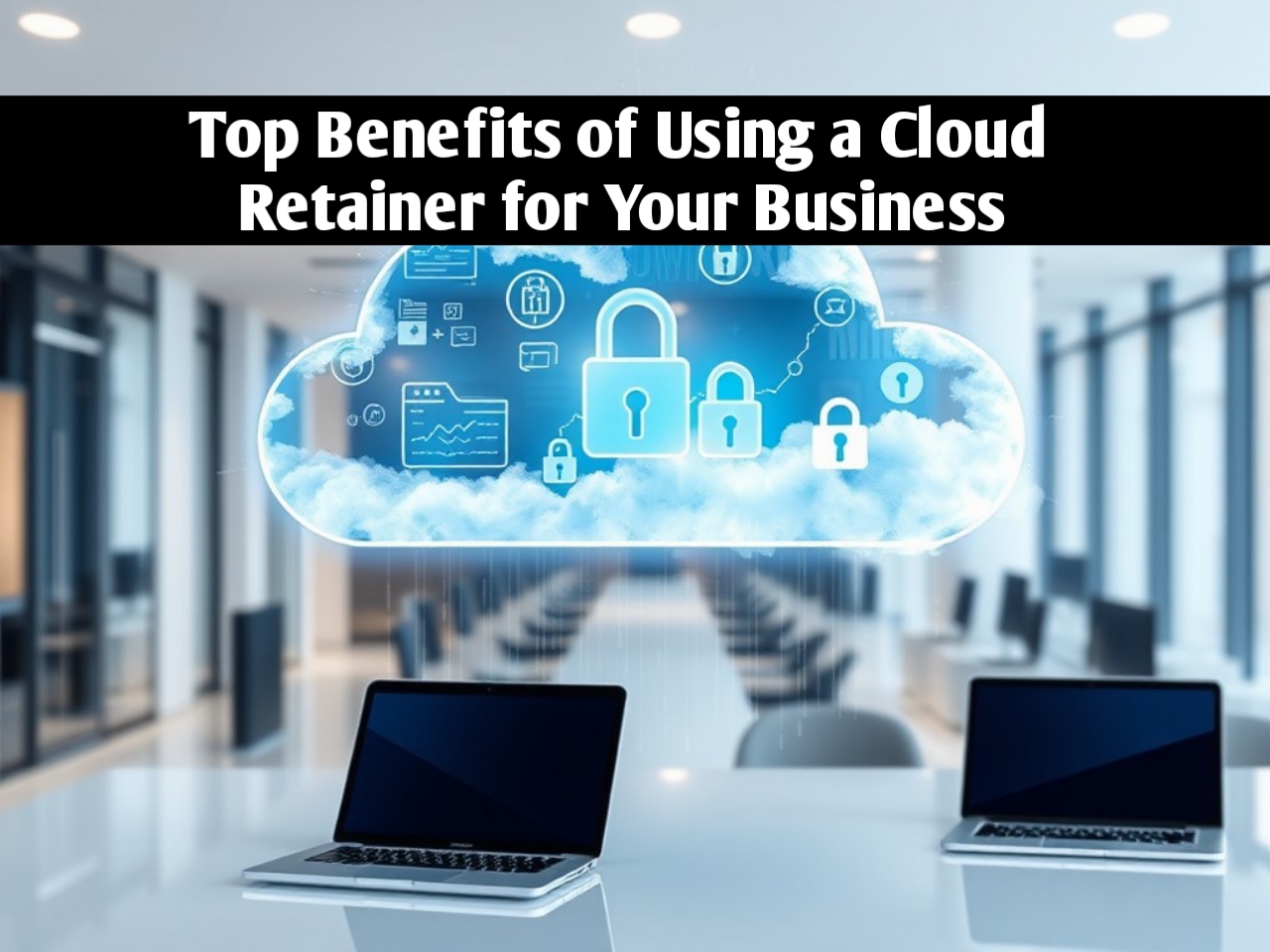Top Benefits of Using a Cloud Retainer for Your Business
As businesses increasingly adopt digital strategies to streamline operations and enhance productivity, cloud computing has become an essential tool in the modern corporate ecosystem. One particular concept that has gained prominence is the “cloud retainer.” This advanced solution offers companies a more efficient way to manage, store, and protect their data while ensuring flexibility and cost-effectiveness. In this article, we will explore the top benefits of using a cloud retainer for your business, detailing how it can be a game-changer for organizations looking to optimize their technological resources and improve operational efficiency.
What is a Cloud Retainer?
A cloud retainer is a service or solution that businesses employ to retain, manage, and store data securely in the cloud. Unlike traditional data storage methods, which often involve physical servers or hard drives, cloud retainers allow businesses to offload their data to remote cloud servers. These servers are managed by third-party cloud providers who offer a wide range of storage and computing resources on-demand.
The “retainer” aspect refers to the ongoing contract or agreement a business has with a cloud provider to retain its data in the cloud environment. This service ensures that the company’s data remains easily accessible, secure, and organized. Cloud retainers are particularly beneficial for companies with large data volumes, those that deal with sensitive information, or those requiring high availability and scalability. As businesses look to future-proof their operations, cloud retainers are becoming a popular choice.
Enhanced Data Security and Protection
One of the foremost advantages of using a cloud retainer for your business is the enhanced security it provides. With cyber threats on the rise and data breaches becoming more frequent, businesses are increasingly prioritizing data security. A cloud retainer allows your organization to benefit from cutting-edge security protocols that are continuously updated and managed by your cloud provider.
Cloud providers invest heavily in cybersecurity technologies such as encryption, multi-factor authentication, and intrusion detection systems. These safeguards ensure that your company’s data remains protected, even in the face of sophisticated cyberattacks. Additionally, most cloud providers offer robust compliance frameworks to meet industry-specific regulations like GDPR, HIPAA, or SOC 2. This makes cloud retainers ideal for businesses that handle sensitive or personally identifiable information (PII).
Furthermore, data stored in a cloud environment benefits from redundancy measures. In case of physical damage to data centers, fire, natural disasters, or even hardware failure, your data remains secure due to these backup measures. Data can also be automatically backed up and restored in the event of a data loss scenario, ensuring business continuity and peace of mind.
Scalability and Flexibility
Businesses that use cloud retainers benefit significantly from the scalability and flexibility that these solutions offer. Traditional data storage systems often limit growth due to the finite capacity of physical hardware. Companies would need to invest in additional servers, physical storage devices, or upgrade existing infrastructure, all of which can be costly and time-consuming.
In contrast, a cloud retainer offers virtually unlimited storage capacity and on-demand scalability. As your business grows, the cloud can easily accommodate increased data storage requirements without needing expensive infrastructure upgrades. This scalability also applies to computing power—if your business needs to run more complex applications or handle heavier workloads, a cloud provider can instantly allocate more resources to meet your needs.
The flexibility of a cloud retainer also lies in its ability to provide businesses with access to their data from any location, at any time. Whether your employees are working remotely or on-site, they can seamlessly access the data they need to perform their duties. This flexibility enhances productivity, collaboration, and ensures that businesses are well-positioned to adapt to modern, hybrid work environments.
Cost-Effectiveness and Reduced IT Overhead
One of the most compelling reasons to adopt a cloud retainer is the cost-effectiveness it offers. Traditional data storage and management systems require substantial upfront investments in hardware, software, and IT personnel to maintain and secure the infrastructure. Additionally, the costs associated with maintaining these systems over time—such as updates, repairs, and power consumption—can quickly add up.
Cloud retainers operate on a pay-as-you-go or subscription-based model, meaning that businesses only pay for the storage and computing resources they use. This eliminates the need for significant upfront investments and allows businesses to manage their expenses more effectively. With a cloud retainer, you can scale up or down as needed without incurring additional costs for underutilized resources.
Additionally, outsourcing data storage and management to a cloud provider reduces the IT overhead associated with maintaining in-house servers and systems. Your IT team can focus on higher-value tasks such as improving business processes, rather than constantly troubleshooting or upgrading physical hardware. For small to medium-sized businesses, this can result in significant cost savings and improved operational efficiency.
Seamless Data Management and Accessibility
Data accessibility is a key factor that can significantly impact a company’s productivity. When data is stored on-premises or in multiple silos, employees may struggle to access the information they need quickly. A cloud retainer simplifies this process by centralizing data storage in a single, secure cloud environment, making it accessible from any location, using any device with internet access.
Seamless data management through a cloud retainer allows businesses to organize, retrieve, and share data with ease. Moreover, cloud-based tools and services enable real-time collaboration between employees, regardless of their physical location. This is particularly beneficial for remote or geographically dispersed teams, as they can work on the same projects and access updated files simultaneously without delays.
Additionally, cloud providers often offer advanced data analytics and management tools, allowing businesses to gain insights into their data usage, performance, and trends. With these insights, companies can make more informed decisions, optimize their operations, and respond swiftly to changes in the business environment.
Disaster Recovery and Business Continuity
Data loss can have devastating consequences for any business. Whether due to hardware failure, natural disasters, or cyberattacks, the loss of critical business data can result in operational downtime, loss of revenue, and damage to a company’s reputation. With a cloud retainer, businesses can leverage robust disaster recovery solutions to ensure their data remains secure and retrievable in the event of an emergency.
Cloud providers offer automatic backups and replication of data across multiple geographic locations, ensuring that even if one data center is compromised, your data remains safe in another. These disaster recovery measures are integrated into the cloud retainer service, offering businesses a much higher level of protection than traditional on-premise systems.
Additionally, cloud-based disaster recovery solutions enable businesses to recover lost data quickly and with minimal disruption to operations. Business continuity is thus assured, as critical systems can be restored in minutes rather than hours or days. This ensures that businesses can maintain operations and reduce downtime in the event of an unforeseen disaster.
Enhanced Collaboration and Workflow Efficiency
A cloud retainer enhances collaboration among teams and departments by providing a centralized platform where data can be stored, accessed, and shared. This is particularly useful in today’s business environment, where remote work and cross-departmental collaboration are becoming the norm.
Cloud platforms offer integrated collaboration tools such as shared document editing, real-time updates, and version control, which enable employees to work on the same projects without worrying about file discrepancies or version mismatches. These tools improve workflow efficiency by reducing delays in information sharing and decision-making, leading to faster project completion and a more agile business process.
Furthermore, cloud retainers allow businesses to integrate various productivity tools and applications into their workflows. Whether it’s CRM systems, project management software, or communication platforms, these integrations streamline processes and reduce the need for manual data entry and administrative tasks.
Improved Regulatory Compliance and Data Governance
For businesses operating in heavily regulated industries, compliance with data protection and privacy laws is non-negotiable. A cloud retainer offers built-in compliance features that ensure your company adheres to relevant regulations. Leading cloud providers are certified to comply with various standards, such as ISO 27001, SOC 2, GDPR, HIPAA, and others, depending on your industry.
These compliance frameworks ensure that your data is handled in accordance with the law, reducing the risk of fines or penalties for non-compliance. Additionally, cloud retainers allow businesses to implement granular control over who can access certain data, ensuring data governance policies are enforced at all times. This is particularly beneficial for organizations that handle sensitive information, such as financial institutions, healthcare providers, or government agencies.
Environmental Benefits of Cloud Retainers
In addition to the operational and financial benefits, using a cloud retainer also contributes to a more sustainable and environmentally-friendly business model. Cloud providers operate large-scale data centers that are far more energy-efficient than small, on-premise server rooms. They use advanced cooling technologies, renewable energy sources, and optimized hardware utilization to minimize their carbon footprint.
By shifting to a cloud retainer, businesses can reduce their own energy consumption, contributing to lower greenhouse gas emissions. This is particularly relevant for organizations seeking to improve their sustainability credentials or meet corporate social responsibility (CSR) goals.
Conclusion: Why Your Business Needs a Cloud Retainer
The adoption of cloud technology is no longer a question of if, but when. Businesses looking to stay competitive in today’s fast-paced environment need a cloud retainer to ensure they are operating with maximum efficiency, security, and flexibility. From enhanced data security to cost savings, scalability, and environmental benefits, cloud retainers offer a comprehensive solution that enables businesses to thrive in the digital age.
Investing in a cloud retainer allows your company to stay agile, reduce operational overhead, and ensure seamless access to critical data. Whether you’re a small business or a large enterprise, a cloud retainer is a smart, future-proof solution that can drive business success and innovation for years to come.
Read Also Our This Post: What to Do When You’re Lost in the Cloud: A Troubleshooting Guide

Kamran Khatri is a versatile writer and editor at ExpressZone.co.uk, bringing fresh perspectives and insightful commentary across a wide range of topics. With a passion for exploring diverse subjects—from technology, business, and finance to lifestyle, travel, and the arts—Kamran aims to inform, inspire, and engage readers through well-researched articles and thought-provoking content.
His work spans multiple categories including health, education, pets, entertainment, real estate, and sustainability, reflecting his commitment to delivering knowledge that connects with everyday life. Whether breaking down the latest trends, sharing practical tips, or highlighting cultural insights, Kamran’s writing combines clarity with creativity.
When he’s not crafting stories for ExpressZone.co.uk, Kamran enjoys keeping up with global developments, exploring innovative ideas, and connecting with readers who share his curiosity about the world.







